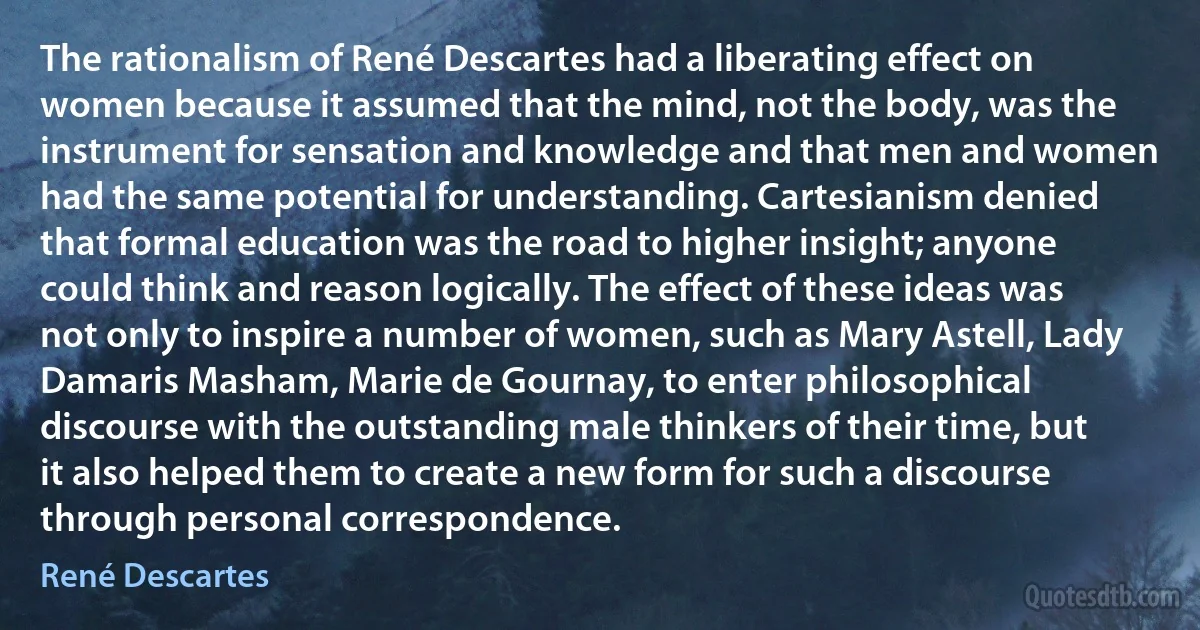
The rationalism of René Descartes had a liberating effect on women because it assumed that the mind, not the body, was the instrument for sensation and knowledge and that men and women had the same potential for understanding. Cartesianism denied that formal education was the road to higher insight; anyone could think and reason logically. The effect of these ideas was not only to inspire a number of women, such as Mary Astell, Lady Damaris Masham, Marie de Gournay, to enter philosophical discourse with the outstanding male thinkers of their time, but it also helped them to create a new form for such a discourse through personal correspondence.
René DescartesRelated topics
anyone body correspondence education enter form formal women men knowledge lady liberating male mind number rationalism reason road sensation think time understanding higher descartesRelated quotes
The indirect influence of Christianity has been to quicken Hinduism to life. The cultured Hindu society has admitted its grievous sin against the untouchables. But the effect of Christianity upon India in general must be judged by the life lived in our midst by the average Christian and its effect upon us. I am sorry to have to re record my opinion that it has been disastrous. It pains me to have to say that the Christian missionaries as a body, with honourable exceptions, have actively supported a system which has impoverished, enervated and demoralised a people considered to be among the gentlest and most civilized on earth...

Mahatma Gandhi
As to the First, methought I had some feeling in the Passion of Christ, but yet I desired more by the grace of God. Methought I would have been that time with Mary Magdalene, and with other that were Christ's lovers, and therefore I desired a bodily sight wherein I might have more knowledge of the bodily pains of our Saviour and of the compassion of our Lady and of all His true lovers that saw, that time, His pains. For I would be one of them and suffer with Him. Other sight nor shewing of God desired I never none, till the soul were disparted from the body. The cause of this petition was that after the shewing I should have the more true mind in the Passion of Christ.

Julian of Norwich
The best educators are the ones that inspire their students. That inspiration comes from a passion that teachers have for the subject they're teaching. Most commonly, that person spent their lives studying that subject, and they bring an infectious enthusiasm to the audience. I think many people have that enthusiasm, but they are prevented from being teachers because they didn't go through the teacher mill. Now you have teachers who have been through the teacher mill, yet they have no capacity to inspire anyone at all. It's the inspired student that continues to learn on their own. That's what separates the real achievers in the world from those who pedal along, finishing assignments.

Neil deGrasse Tyson
Consider your state of mind-your consciousness-before going to sleep. This is extremely important. Make a commitment to spend at least fifteen minutes spiritualizing your consciousness before going to bed. Read something spiritual, listen to spiritual discourse or music, or engage in discussion on a spiritual topic. Push aside the chaos and confusion that were a part of your day, and focus on spiritual reality. In this way, you will prepare yourself for the next six to eight hours of sleep. If you allow yourself to focus spiritually, you will provide less of an opportunity for negative elements to enter your dreams. You can then benefit most from your sleeping state.

Bhakti Tirtha Swami
Do everything simply and meekly. Do nothing with an ulterior motive. Don't say, I'll do this in order to have that result, but do it naturally, without taking cognizance of it. That is, pray simply and don't think about what God will bestow on your soul. Don't make any calculations. You know, of course, what God bestows when you enter into communion with Him, but it is as if you don't know. Don't discuss the matter even with yourself. So when you repeat the prayer, "Lord Jesus Christ, have mercy on me”, say it simply and ingenuously and think of nothing other than the prayer. These are very delicate matters and the intervention of the grace of God is required.

Porphyrios of Kafsokalyvia
